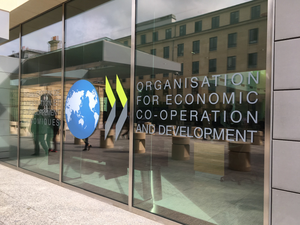Businesses
Merchants with Paytm QR don't need to look for alternatives: Here are the facts
New Delhi, Feb 13 (IANS) Paytm, the pioneer of QR and mobile payments, on Tuesday announced that its QR codes will continue to function as usual, allowing merchants to accept payments beyond February 29, 2024.
Payment devices such as Paytm Soundbox and card machines will also continue to remain operational as always.
Some merchants have repayment arrangements set up through the PPBL bank account, as the settlements were being processed there. Now we need to migrate their settlement account to another bank of their choice so that settlements continue to be received and repayments can proceed uninterrupted.
Now, this migration of Paytm merchants’ settlement account to a bank of their choice will happen at the back-end, a process similar to mobile number portability. It will not impact the merchants and customers on the front-end, said the company.
The company is in talks with India’s leading banks and will partner with one of them to ensure that there is no disruption to merchants.
“Over the past two years, Paytm has collaborated with multiple banking partners for a host of services. For services like Paytm QR, where Paytm Payments Bank, acts as a back-end bank, these services will seamlessly transition to other partner bank/s. This means that there will be continued service available to its merchant partners,” a company spokesperson said.
Following an update by the RBI during the Monetary Policy Committee regarding Paytm Payments Bank, the Deputy Governor emphasized that the opportunity for partnership with Paytm Payments Bank will be a prerogative of banks, paving way for ongoing and possible collaboration between Paytm Payments Bank and other banking institutions. Such a partnership will aim to establish a strong framework for offering innovative financial solutions to customers.
Paytm management assured that there would be no disruption to merchants and their payment services.
From bustling metropolises to remote rural areas, businesses of all sizes are embracing Paytm’s innovative solutions. Merchants from every corner of the country are actively endorsing the Paytm brand, contributing to its stronghold as a leading player in India’s payments landscape.
These widespread endorsements serve to solidify Paytm’s reputation as a trusted partner for businesses nationwide, further cementing its position at the forefront of India’s rapidly evolving payments industry.
–IANS
na/dan
Businesses
India to see rise in private consumption in FY25 driven by rural demand

New Delhi, July 11 (IANS) Driven by rural demand recovery owing to normal monsoon and moderating inflation, India is projected to see a surge in private consumption in the current fiscal, a report has said.
According to India Ratings and Research, the rise in private consumption would lead to more balanced growth, reducing the disparity between premium and value segments.
According to the report, urban demand will also continue to grow but at a slower pace.
The growth disparity would moderate in FY25, exhibiting slightly more broad-based growth contours, said India Ratings.
There has been a constant rise in rural consumption demand in recent years.
Riding on a revival in rural demand and steady urban growth, the fast-moving consumer goods (FMCG) sector in India is also projected to see a revenue growth of 7-9 per cent this fiscal.
According to a recent Crisil Ratings’ study of 77 FMCG companies, “We expect volume growth of 6-7 per cent in fiscal 2025 from the rural consumers (40 per cent of overall revenue), supported by expectation of better monsoon benefitting agricultural production, and hike in minimum support price supporting farm incomes.
According to the report, higher government spending on rural infrastructure, primarily through Pradhan Mantri Awaas Yojana-Grameen (PMAY-G) for affordable houses, will aid higher savings in rural India, supporting their ability to spend more.
On the other hand, according to the Crisil report, volume growth from urban consumers will remain steady at 7-8 per cent during fiscal 2025 supported by rising disposable incomes and continued focus on premium offerings by the players, especially in the personal care and home care segments.
The food and beverages (F&B) segment is expected to grow 8-9 per cent this fiscal, aided by improving rural demand.
–IANS
na/dpb
Businesses
Five automakers to recall over 1,56,000 cars for faulty parts

Seoul, July 11 (IANS) Kia, Nissan Korea and three other carmakers will voluntarily recall more than 1,56,000 vehicles due to faulty components, the transport ministry here said on Thursday.
The five companies, also including Hyundai Motor Co., Porsche Korea and Toyota Motor Korea Co., will recall 1,56,740 units of 32 different models, the Ministry of Land, Infrastructure and Transport said in a statement.
The problems that prompted the recall include poor durability of the electronic control hydraulic unit of 1,39,478 units of the Sorento SUV model, reports Yonhap news agency.
Also, 8,802 vehicles across eight Nissan models, including the Q50 model, were found to have defective manufacturing of the propeller shaft.
Hyundai’s luxury brand Genesis will recall 2,782 GV70 units due to defective engine ignition connection bolts. Porsche Korea will recall 2,054 vehicles across 17 models, including the 911 Carrera 4 GTS Cabriolet, due to a safety issue involving the lane-keeping function.
Toyota Korea will recall 737 vehicles across three models, including the Prius 2WD, due to a defect in the rear door external handle, the ministry said.
–IANS
na/dpb
Businesses
OECD brands New Zealand as a 'red tape country'

Wellington, July 11 (IANS) New Zealand is a country full of regulatory barriers, said a survey released by the Organisation for Economic Cooperation and Development (OECD) on Thursday.
New Zealand Minister for Regulation David Seymour stressed the need for New Zealand’s regulatory reform, citing areas that are found to be particularly overregulated including barriers to foreign direct investment, acquiring licences and permits, and administrative and regulatory burden.
“It is too difficult to invest, and Kiwis have their productivity sapped because of the time spent complying with edicts from Wellington,” Seymour said.
The result from the five-yearly OECD Product Market Regulation Indicators should end any and all doubt that the government must go to war on red tape and regulation, he said.
The quality of regulation in New Zealand is in freefall, from being ranked second in 1998 to twentieth in this year’s survey, he said, adding that it is no coincidence that New Zealand experienced strong productivity growth in the 1990s but has fallen behind since.
The Ministry for Regulation aims to cut existing red tape with sector reviews, to improve the scrutiny of new laws, and to improve the capability of the regulatory workforce.
“The culture of lawmaking needs real change, so Kiwis spend less time complying, and more time doing. The end result is higher wages and lower living costs,” the minister said.
The OECD survey, of about 1,000 questions, assesses the degree to which policies and regulations promote or inhibit competition in product markets.
–IANS
int/rs/kvd
Businesses
Union Budget: PM Modi to meet prominent economists today

New Delhi, July 11 (IANS) Prime Minister Narendra Modi will on Thursday hold a meeting with leading economists to discuss the Union Budget 2024-25.
The budget will be presented by Finance Minister Nirmala Sitharaman in Parliament on July 23. The Budget Session will start on July 22 and conclude on August 12.
Economists, industry experts and Niti Aayog Vice Chairman Suman Bery will discuss the fiscal situation and strategies, and also present views and recommendations to the Prime Minister at the meeting, according to sources.
This will be the first Budget of the Modi-led government in its third term at the Centre.
PM Modi returned to the national capital on Thursday morning after concluding his two-nation visit to Russia and Austria.
Last month during her address to a joint session of Parliament, President Droupadi Murmu indicated that the government would come out with historic steps to accelerate the pace of reforms.
Finance Minister Nirmala Sitharaman has held discussions with various stakeholders, including economists and captains of industry on the forthcoming Budget.
–IANS
dpb/
Businesses
MSMEs key to making India a leading electronics manufacturing destination: MeitY Secy

New Delhi, July 10(IANS) The Micro, Small, and Medium Enterprises (MSME) sector can play a key role in making India a leading electronic manufacturing destination, S. Krishnan, Secretary, Ministry of Electronics and Information Technology (MEITy), said on Wednesday.
In his address at the CII MSME Growth Summit here, he said that this can be achieved by increasing the proportion of domestically manufactured components.
“Manufacturing will play a major role in the structural transformation of the Indian economy and electronics will be an important sector driving this transition. We should enhance domestic value-add in electronics from 18-20 per cent to 35-40 per cent within the next five years,” Krishnan said.
“MSMEs will play a crucial role in this effort and have a huge role to play in electronics components manufacturing.”
He emphasised the huge potential that digitisation holds to be a game changer for the MSME segment. Adoption of technology by smaller players through cluster-based facilities and retrofitting existing facilities are cost-effective ways to go digital for this segment.
Underlining the importance of a digital economy, he said that MeitY is working to assess the size of the digital economy in the country.
Dr Ishita Ganguli Tripathy, Additional Development Commissioner, Ministry of MSME, highlighted that women’s participation in registered MSMEs needs to be increased from 39 per cent. She emphasised leveraging the “7 As” to empower women: availability, accessibility, affordability, awareness, accountability, alliance, and achievement.
She added that educating MSMEs about regulatory requirements and ESG compliances is essential for their sustainable growth.
Government and large enterprises can play an important role in supporting MSMEs and MSMEs must leverage the digital ecosystem, said T Koshy, Managing Director & CEO, Open Network for Digital Commerce (ONDC).
He added that the network is also adding insurance as a new component which will be visible soon.
–IANS
rvt/vd
-
Video1 year ago
PM Modi Attacks Congress in Karnataka with “Kerala Story”
-
Cricket1 year ago
CSK players rejoice 5th IPL title with their families (Pics)
-
Politics1 year ago
Siddaramaiah & DK Shivakumar sworn in as Chief Minister & Deputy CM respectively
-
Entertainment1 year ago
Karan Deol weds his longtime Girlfriend Drisha Acharya (Pics)
-
Entertainment1 year ago
Urvashi Rautela dazzles on Cannes 2023 red carpet (Pics)
-
Entertainment1 year ago
Sunny Leone gets ready for Kennedy premiere in Cannes (Pics)
-
Entertainment1 year ago
Alia Bhatt looks crazy beautiful in Prabal Gurung creation at MET GALA 2023 (Pics)
-
Cricket1 year ago
Sakshi & Ziva Dhoni enjoy their time during CSK VS MI match
































